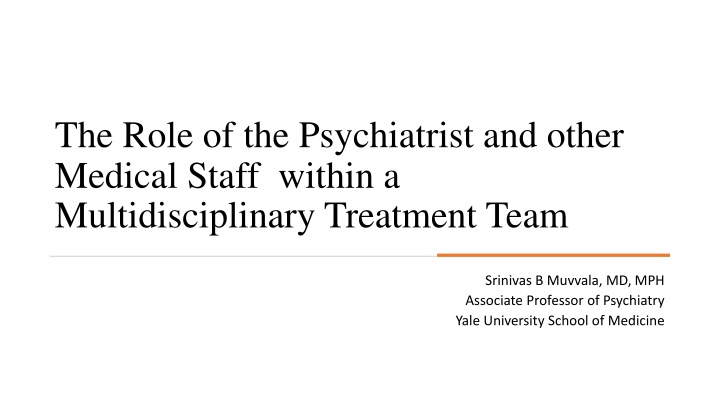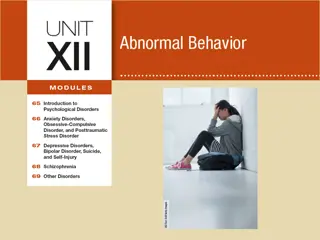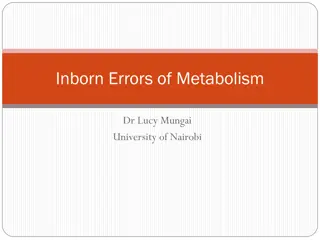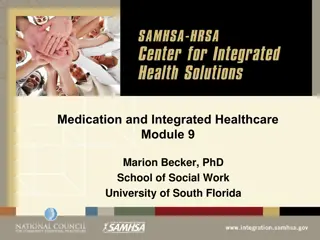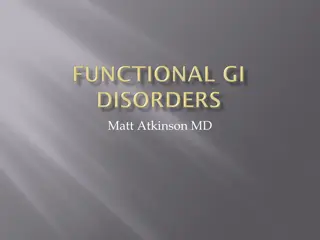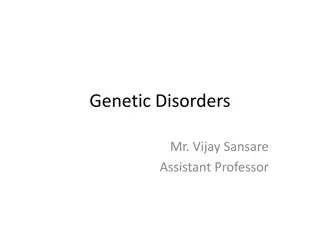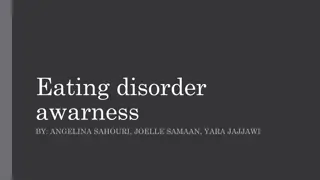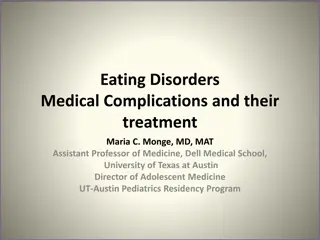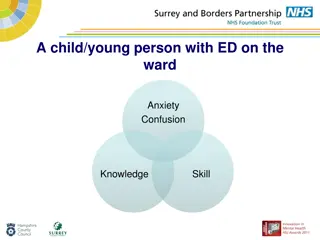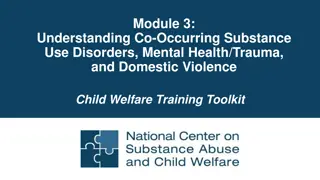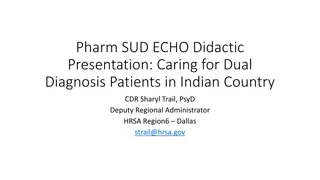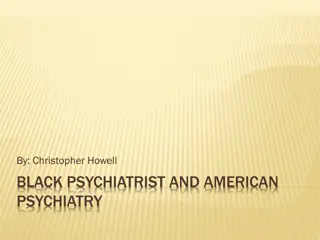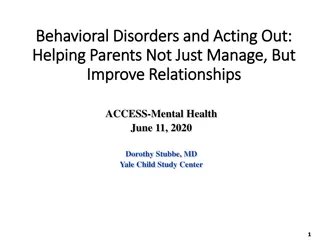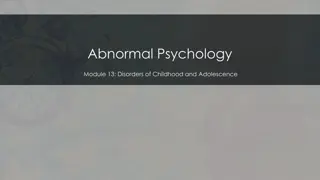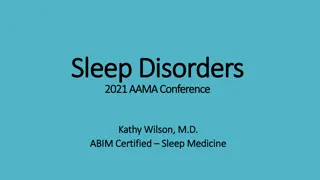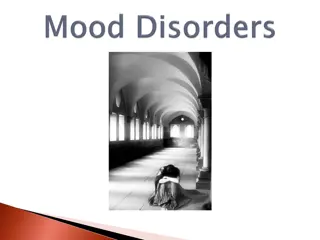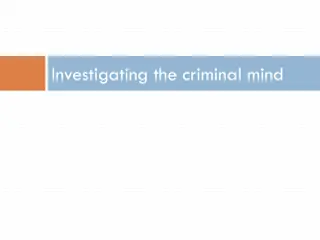The Role of Psychiatrists in Co-occurring Disorders Treatment
Psychiatrists play a crucial role in treating co-occurring substance use disorders alongside other medical staff in a multidisciplinary team. Integrating mental health and addiction treatment is essential, as only a small percentage of individuals with addiction receive care. Factors promoting optimal collaboration among interprofessional team members are vital for addressing the significant comorbidity of substance use disorders and mental illnesses. The shift towards integrating addiction treatments into routine practice emphasizes the importance of psychiatrists and mental health providers owning these interventions.
Download Presentation

Please find below an Image/Link to download the presentation.
The content on the website is provided AS IS for your information and personal use only. It may not be sold, licensed, or shared on other websites without obtaining consent from the author.If you encounter any issues during the download, it is possible that the publisher has removed the file from their server.
You are allowed to download the files provided on this website for personal or commercial use, subject to the condition that they are used lawfully. All files are the property of their respective owners.
The content on the website is provided AS IS for your information and personal use only. It may not be sold, licensed, or shared on other websites without obtaining consent from the author.
E N D
Presentation Transcript
The Role of the Psychiatrist and other Medical Staff within a Multidisciplinary Treatment Team Srinivas B Muvvala, MD, MPH Associate Professor of Psychiatry Yale University School of Medicine
Disclosures Dr. Muvvala consulted for Alkermes previously
Integrating care Describe the role of psychiatrists and other medical staff in treatment of co-occurring substance use disorders Multidisciplinary team Recognize the importance of multidisciplinary team approach in integrating mental health and addiction treatment Objectives Interprofessional collaboration Discuss the factors that promote optimal collaboration among members of interprofessional team
Only one in ten people with addiction receive care 5.7% with AMI and SUD receive both treatments The Problem SAMSHA 2021
Integrating Mental Health and Addiction Treatment Facilitators Challenges Ref: SAMSHA 2009
Why? Lack of provider education Stigma
1100 Addiction Psychiatrists only Role of Psychiatrists and other Mental Health Providers Significant comorbidity of SUD s and mental illness (anxiety, depression, ADHD, psychosis, suicide) Psychiatrists are uniquely skilled as they can provide integrated mental health care and relapse prevention counselling Shift of buprenorphine prescribing to primary care (Psychiatrists 92.2% in 2003 to 32.8% by 2013) General psychiatrists and mental health providers must own and integrate addiction treatments into their routine practice Ref: Muvvala et al, JAMAPsych 2018
Medications for Treatment Prevention Screening/ SBIRT Prescribers role? Preventing infections (Education regarding safe use, needle exchange programs) Harm reduction/ Overdose education Multidisciplinary Collaboration Medical comorbidities Training and education (PCSS-MAT Special populations
Strategies to incorporate Integrating prevention and treatment for SUD s into practice Hospital setting Outpatient setting SUD treatment into clinical practice
Hospital setting Starting medications for addiction treatment in the hospital Collaborating with outpatient providers for appropriate referral to treatment Overdose prevention training and naloxone prescribing for all clients at risk Education about risk reduction (safe use, infections) BUP initiation in ED : (78 vs 37% engagement) Screen for medical problems, treat/ refer to treatment Screen for risk factors and intervene Family involvement and education Avoid polypharmacy
Outpatient setting Integrating mental health and SUD treatment Medications for addiction treatment Screening & Diagnosis Treatment Planning Drug screens Screening for medical complications, referral to medical care Overdose prevention training and naloxone prescribing Prescription monitoring systems Avoid Polypharmacy Preventing infections Training: Counselling services/ Therapy planning Family involvement Recovery supports Staff Education Ex: Obtain waiver 8- hour training
Interprofessional Collaborative Practice Other Physicians Psychiatrist APRN PA Psychologist Addictions counsellor Medical Students Social Work Nursing Residents Peers supporting recovery Occupational Therapy Physical Therapy Admin & other staff Pharmacist
Promoting interprofessional collaboration: A CULTURE OF CARING: Synergy improves outcomes Providing constructive feedback Creating a positive environment Developing ownership mentality Sharing leadership responsibilities Working together with kindness Caring relationships Valuing team members expertise Strengths based practice Taking accountability and responsibility First and Last lines of Defense Adapted from: ly Wei, Robin Webb Corbett, Joel Ray & Trent L. Wei (2020) A culture of caring: the essence of healthcare interprofessional collaboration, Journal of Interprofessional Care, 34:3, 324-331
Supervising physicians responsibilities with nurse practitioners and physician assistants Physician retains ultimate responsibility of the patient care rendered when required by state law Physician is responsible for reviewing the work, records and practice of the APRN and PA Physician is responsible to ensure that appropriate directions are given, understood and executed in treatment planning Physicians must review the quality of care rendered by the treatment team Ref: https://www.aafp.org/dam/AAFP/documents/news/NP_Info_GlinesNP-060710.pdf
Define Establish regular and open communication responsibilities of team members Responsibilities of the team leadership Reduce barriers to care Patient centered care
CMHC: Collaboration between DMHAS and Yale University School of Medicine Addiction psychiatrist- Dr. Oluwole Jegede, MD MPH MAT Nurse: Jennifer Mastriano, RN MAT MAT Staff/schedule Staff/schedule Addiction Psychiatry Fellows- HRSA grant Trainees: medical students, psychiatry residents, and addiction fellows. Approximately >350 unique patient schedules over 10 months
Innovative model of addiction treatment in ambulatory settings. Integrates SUD treatment into general psychiatry setting. Community Community MAT MAT consultation consultation clinic in brief clinic in brief Fidelity to consultation, harm reduction and open access models. Likely easy to replicate and scalable- studies underway. Provide support to psychiatric providers who may not be willing or unable to treat SUDs. Academic detailing- hub for psychiatric trainees and monthly addiction seminars.
ALL SUDs: Opioid use disorder Alcohol use disorder Tobacco use disorder Stimulant use disorder Sedative/Hypnotic/Anxiolytic use disorder Hallucinogen related disorders Scope of MAT Consultation Service Clinic and Home inductions of buprenorphine Back-up for maintenance therapy of buprenorphine
Psychiatrists and other mental health providers are naturally equipped to treat substance use disorders Summary Integrated care is essential to improve mental health and SUD treatment outcomes Treatment must be provided by multidisciplinary team and physicians/ team leadership must foster collaboration among various disciplines
Source: Dont Judge Me Until Youve Walked In My Shoes http://sumo.ly/yS6I via @tonyfahkry. Accessed 10/12/17
Substance Abuse and Mental Health Services Administration. Integrated Treatment for Co-Occurring Disorders: Building Your Program. DHHS Pub. No. SMA-08-4366, Rockville, MD: Center for Mental Health Services, Substance Abuse and Mental Health Services Administration, U.S. Department of Health and Human Services, 2009. Muvvala SB, Edens EL, Petrakis IL. What Role Should Psychiatrists Have in Responding to the Opioid Epidemic? JAMA Psychiatry. 2019 Feb 1;76(2):107-108 Holly Wei, Robin Webb Corbett, Joel Ray & Trent L. Wei (2020) A culture of caring: the essence of healthcare interprofessional collaboration, Journal of Interprofessional Care, 34:3, 324-331 References Substance Abuse and Mental Health Services Administration. (2021). Key substance use and mental health indicators in the United States: Results from the 2020 National Survey on Drug Use and Health (HHS Publication No. PEP21-07-01-003, NSDUH Series H-56). Rockville, MD: Center for Behavioral Health Statistics and Quality, Substance Abuse and Mental Health Services Administration. Retrieved from https://www.samhsa.gov/data/ Accessed September 20, 2022 https://www.aafp.org/dam/AAFP/documents/news/NP_Info_Gl inesNP-060710.pdf. Accessed September 20, 2022
